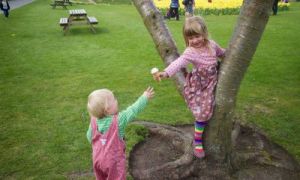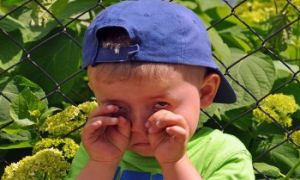As part of your child's development it is normal for your child to have anxiety and fears. A baby commonly shows a fearful sign to loud noise or loss of physical support. Your child's reluctant to separate from you is a normal and healthy response and indicates healthy attachment. To some degree, separation anxiety is a sign that your child has developed healthy attachments to love ones. In most cases, it stops within 3-4 minutes after you leave.
Some children seem more irritable and clingy as infants, have more trouble establishing a regular daily schedule and have more difficulty with transitions. Such children may be more vulnerable to separation anxiety. This just means your child may require more work and attention. However, if your child is showing a more difficult temperament now, it does not necessary lead to difficult problems in late childhood.
Normal Development of Separation Anxiety in Children
At around nine months of age is when separation anxiety usually develops and peaks around 12-24 months. Your child crying and clinging can express two different meanings. First, your child may cry when you leave, because they fear that you will never return or Secondly, often after a good day, your child begins to cry when you return to pick them up. This is because when you return to pick up your child, they are reminded of how they felt when you left.
Sometimes your toddler (between the ages of 1 and 2) may crawl or walk away themselves and then become anxious at the separation they themselves have created. It is normal for your child to be shy with strangers but morning separation does become easier. Each day varies when dealing with separation anxiety. One day your child may be fine and settle in rather quickly and on others they may become clingy and sad.
Many two-year-old toddlers go through a phase when they prefer a particular parent. This can exhaust the desired parent and make the other parent feel unloved. The child has more of a drive toward independence. Still transition times can be difficult and lead to temper tantrums.
If your toddler has experienced very few separations from you, they normally experience the most separation anxiety. Even You and I both experience separation anxiety when separated from loved ones (most of the time) but usually not so overwhelming. We have a better concept of time and we have had more experience dealing with this.
Considering Factors for Separation Anxiety in Toddlers
There are many factors that may contribute to anxiety separation in children. These include:
- Being tired
- Feeling unwell or sick
- Changes in the routine at home.
- Any family changes such as birth of a sibling, divorce, death or illness.
- Change in caregiver or routine at the child care center.
- You (the parent) usually are not the cause of the separation anxiety but you can make things worse or better.
There are also factors that may reduce the chance of separation anxiety in children. These include:
- By six months of age start using a babysitter (family or friends) occasionally. This helps your baby handling short periods away from you and encourages them to trust in adults.
- By twelve months of age, introduce your child in a playgroup, so they are able to have contact with kids their own age. By the time your child in three years old, they should be experiencing play groups.
- When your child turns three or four years old it may be helpful to introduce some form of preschool. Especially if your child is dependent on you because it may become too difficult when they start school.
Supporting your Child through Separation Anxiety
Here are some strategies you could use to make your child's separation anxiety easier:
- Have a clear and consistent morning and bedtime routine.
- If your child has a “special toy”, allow them to take it with them.
- Help your child become familiar with new environments and people before actually leaving the child there.
- Do not give in. Let your child know that they will be all right.
- Remind your child of previous brave things they have done. Talk about how their favourite character might handle it.
- Try to understand and accept what your child is going through.
- Never make fun of your child's separation anxiety. Do not scream at your child for it.
- Do not bribe your child. If you plan a special activity after you pick the child up, let it be unconditional.
- Focus on the positive things that have happened in your child's centre. Don't let your child focus on fears or imagination of what might happen.
- Minimize fears by limiting scary TV shows.
- If it is an older child, consider introducing them to some of the children who are in the same class and arrange play dates for your child at a friends house.
- Read books with your child about going to preschool, pretending about going on voyages or quests.
- Make shopping for school / childcare items a special event just for that child.
- Expect your child to be more tired and possibly more irritable than usual when they start Kindergarten or First grade for the first few weeks.
- When leaving give a quick kiss and hug and cheerfully say goodbye (even if your child is screaming and yelling).
- Don't sneak out of the room. Sometimes when you sneak out your child will become over anxious when they cannot find you. If you make “sneaking out” a habit, your child will become more distressed when they can't see you, even if you are at home.
- Don't prolong your departure or come back several times (the staffs understand how to handle these situations. Ring up and speak to your child's teacher if necessary).
- If you feel that a teacher or a bully might be part of the problem, speak up and let the director/principal know. Arrange for a meeting and get the issue sorted out.
Your child will eventually lose their fears of separation anxiety. Some children take longer than others. Working in partnerships with your child's childcare centre or school helps create a trusting environment for your child and make the transition a lot easier for you and your child.


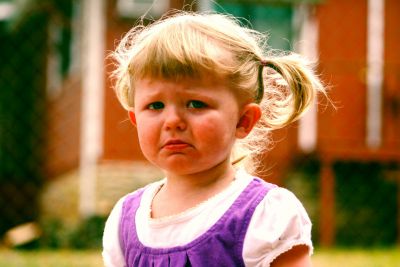
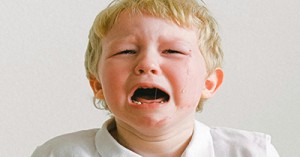

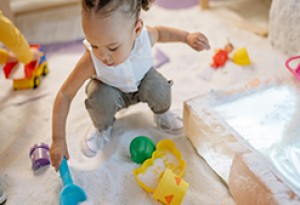
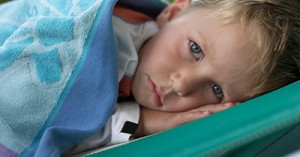
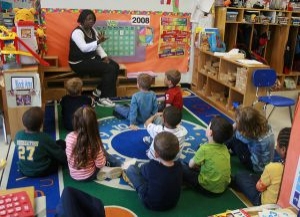 Working as a childcare professional can be a challenge especially when dealing with behavioural problems which may arise. The techniques we use when dealing with
Working as a childcare professional can be a challenge especially when dealing with behavioural problems which may arise. The techniques we use when dealing with There are different types of behaviour that children can display and sometimes it can be hard to manage, especially if a child is having behavioural
There are different types of behaviour that children can display and sometimes it can be hard to manage, especially if a child is having behavioural As a parent, your behavioural expectations of your child can be higher than what is actually developmentally appropriate for your child's age.
As a parent, your behavioural expectations of your child can be higher than what is actually developmentally appropriate for your child's age.
 As Educators, there will be many instances where you will need to write about a child's behaviour. For a behaviour management plan, assessments, half-yearly or
As Educators, there will be many instances where you will need to write about a child's behaviour. For a behaviour management plan, assessments, half-yearly or As Educators when communicating with Parents (through verbal or non-verbal communication), there will be times where we need to discuss issues or concerns that may
As Educators when communicating with Parents (through verbal or non-verbal communication), there will be times where we need to discuss issues or concerns that may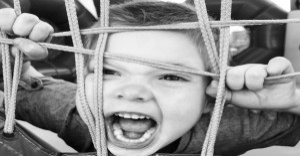 Challenging Behaviour is when a child does something that hurts themselves and/or other people.
Challenging Behaviour is when a child does something that hurts themselves and/or other people.
 As part of your child's development it is normal for your child to have anxiety and fears. A baby commonly shows a fearful sign to
As part of your child's development it is normal for your child to have anxiety and fears. A baby commonly shows a fearful sign to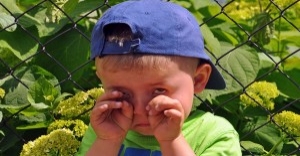 It's always difficult to bring up behavioural issues with parents, it can be nerve wrecking to tell a parent that their child misbehaves but that
It's always difficult to bring up behavioural issues with parents, it can be nerve wrecking to tell a parent that their child misbehaves but that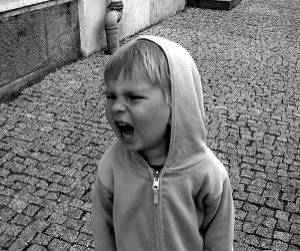 All children deal with anger on a daily basis. Thinking about it as a child, there is a lot to be angry about. Elder people
All children deal with anger on a daily basis. Thinking about it as a child, there is a lot to be angry about. Elder people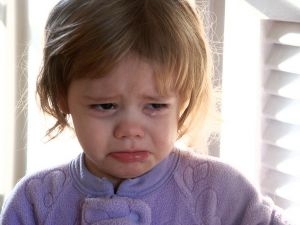 It is important to understand that your child behaviour problems could not just be from attention seeking. There are many factors to take into consideration
It is important to understand that your child behaviour problems could not just be from attention seeking. There are many factors to take into consideration
